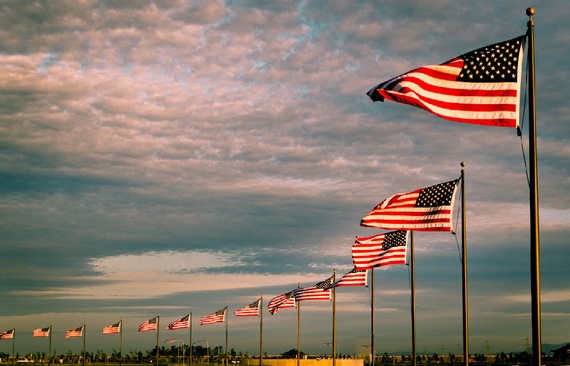American exceptionalism predates even the birth of America as a nation-state. Two streams of thought flow from the spring of American exceptionalism. One stream of thought motivates the thinking of being ‘superior to other nations’; this stream has been reflected in phrases such as ‘city upon a hill’, ‘anti-imperialism’, ‘isolationism’ and ‘Fortress America’. The second stream is more of a ‘missionary’ character. It is more dominant in American foreign behaviour. It has been signified by the ideas of ‘manifest destiny’, ‘internationalism ‘, ‘leader of the free world’, ‘modernisation’ and ‘new world-order’. Both these streams of thought have played a notable role in developing the political culture of America and in shaping the intellectual framework for the formation of the US foreign policy.
The political culture of America is defined in terms of adherence to ‘American values’. These are general sets of principles which have been termed “American Creed” by Samuel P. Huntington. The American creed of Huntington constitutes freedom, fraternity, individualism, self-determination and the rule of law under the constitution It also integrates what Martin Lipset referred to as egalitarianism, individualism, populism and laissez-faire. These elements constitute the national character of the United States, which has been created rather than inherited. Thus, if we recall the ‘Waltzian Structure’ and Waltz’s analogy of ‘economic market’ which states that the market created by individuals manipulates the behaviour of the same individuals, the conclusion follows that the created political identity/culture, has taken the form of a structural force which shapes the behaviour of the practitioners of politics in the U.S.
The American political culture believes that American ideology or nationalism is unique as her nationalism is an adherence to these values, irrespective of colour and creed. It is from these elements that the U.S. foreign policy derives its missionary character. Its intellectual framework backed by nationalist sentiments is considered a promotion of American values and the salvation of mankind.
Four important features of American exceptionalism highlight the intellectual input in the foreign policy circles of the United States. Firstly, the Americans are an exceptional creed and chosen people with a mission. This belief has existed since the colonial struggle for what John Winthrop back in 1630 called a ‘city on a hill, the eyes of all people are upon us’. This then engendered the idea of world leadership in the political culture of the USA.
The second exceptional element of exceptionalism is in the belief of ‘New-World’. This shapes the distinctive element of the American homeland which is based on the freedom of individuals, morality, and working for the betterment of humankind. It is different from the world of Europe where dirty-politics, monarchical interests and imperial greed rate higher than individual liberty and social welfare of a community.
The third element of American exceptionalism that dominates the foreign behaviour is the belief that America is not destined to follow the course of history, that the oceanic insularity of the USA could save America from indulging into the dirty politics that have been responsible for the downfall of great nations.
The fourth element that contributes to America’s exceptional character is that—as elucidated by K. J. Holsti—United States being the leader may sometimes transgress international norms for the promotion of American values for ‘universal good’. Characteristically, according to Holsti, exceptionalism entails: a) a responsibility and an obligation of ‘liberating’ others; b) that international norms governing the conduct of ordinary states are not applicable to the exceptionalist state because the exceptionalist state’s cause is of a global responsibility; c) viewing the world as hostile and against its exceptional values; d) hostility facilitates the institutional structure of the exceptionalist state; e) an element of innocence forming part of the exceptional character, streamlines the hatred of the world against its exceptional values.
Americans hold the values that constitute the ‘American creed’ in high esteem. According to Seymour Martin Lipset, they consider their institutional setup exemplary. Throughout the course of history, if we observe the foreign engagements of the US, the element of exceptionalism is always present. The exceptionalist belief is always shaped by the debate of American values and the United States being superior to other states. American foreign behaviour has always had to pass through the test of whether the US would remain isolated, keep itself distanced from the dirty and corrupt politics of the old-world and preserve its exceptional values of American creed from distortion or, if it would spread the American values by engaging in the world to make it a better place to live. In the League of Nations, the pendulum swung to the isolationist corner. It was Pearl Harbour, 1941, that had forced the Americans to shed the isolationist behaviour and since then the US has adopted the policy of foreign involvement. Even then it was a foreign policy backed by moral cause. The American policy was interwoven with the exceptional character of America’s political culture. The liberals quite often declare that the rhetoric of exceptionalism is counter-productive for the foreign pursuits of America as it creates envy among other nations. They certainly regard America to behave ‘normally’ in the community of nations, to maintain a low decorum in the community of states as this will support the American cause. The exceptional perception of Americans does not facilitate the causal relationship of American creed and its Exceptionalist behaviour.
The American identity, perceived to be exceptional, has played a vital role in the formation of American foreign policy. It has an influence on both the ‘identity dichotomy’ and ‘foreign policy dichotomy’, as Hilde Eliassen Restad terms them.
The identity dichotomy consists of the ‘exemplary’ and ‘missionary’ exceptionalism. This, on one hand, inspired the behaviour of ‘to remain aloof and lead as an exemplary model’ motivated by a warning from Washington against alliance-formation. On the other hand, it promoted ‘spreading the ideas of democracy and laissez-faire’ in the world, inspired by Woodrow Wilson’s slogan ‘to make the world safer for democracy’.
In an interesting interpretation, Hilde Restad has combined the exemplary character of American exceptionalism with the missionary. He argued that since the days of John Winthrop the ‘Massachusetts Bay Colony’ has taken up the task to purify the English Civilisation. It was the same idea that has been shared by the scholars of neo-conservatism. Huntington asked the Americans to shoulder the responsibility of the leadership of Anglo-American Civilisation and to protect it from the emerging and resurging civilisations. Charles Krauthammer has regarded the isolationist’s foreign behaviour as obsolete and cowardice.
The missionary character of American exceptionalism has its roots in political exceptionalism. The political exceptionalism originates from the political struggle against imperial Great Britain. The success of American-Revolution, the Philadelphian Convention, the bill of rights and the democratic traditions regarded America exceptional among the democratic countries of Europe, about which de Tocqueville wrote.
American exceptionalism is an ideology. This entails a belief that the American ideology needs to be promoted, as the world is waiting for it. It is this thinking that motivates the foreign policy makers and unites the various brands of presidents together from Thomas Jefferson to Woodrow Wilson, from Ronald Reagan to Clinton and from George Bush to Barack Obama. Consequently, this belief in American exceptionalism and the transfer of American creed to the outside world which is as American in nature as the authors of the constitution has become an essential part of the American foreign policy since its inception but even more so since the Second World War.
Exceptionalism is a structural constraint on the political makeup of American politics or one can call this its foreign behaviour. It has the same effect on the American political leaders as that of the market of micro-economic theory, which once formed becomes independent, develops its own forces and acts on them. The exceptionalism of America has a feature which could also be explained by Alfred E. Kuhn’s ‘tyranny of small decisions’. By this he means ‘unconscious decisions of a small number of people set a particular trend’, which eventually turn into a ‘force’. Same is the case with the ‘American Creed’. In the construction of an identity different and distinctive, the leaders of the then United States of America have created a new identity/force for nationalistic purposes for the people of the then colonies to differentiate them from the European world where nationalistic feelings were of colour, creed, religion and blood. This eventually turned into a ‘structure’. This structure is thus far acting as a constraint on the behaviour of the American political leaders. It has the features of a ‘chooser and selector’. It socializes the American political leadership in the values of ‘American creed’.
Exceptionalism acts as an anarchy of American politics. Thus far, it has been associated with the American foreign behaviour in order to justify its structural constraints at the domestic level, as “structural constraints cannot be washed away”.What the units (the political leaders in the case of exceptionalism) wish cannot be achieved as the structure has a role to play. And it is this structure that has kept the outcome different from the intended actions of the units. It remained self-sustained and recurring in American political ideology. Its forces are important to understand, which if understood properly will support the actor and if surpassed then it can punish the leadership.
The messianic character of American exceptionalism dominated the American foreign policy in the era of cold-war. Cold-War was a struggle between the exceptional character of the USSR and the US, where the battle field was Europe and Asia. The Soviet exceptional element sprung from their unmatched ‘military strength’ in Europe and pride in their resilience, for they had defeated the Napoleonic scourge in the 19th century and that of Hitler in the 20th century. Soviet exceptionalism, on one hand was focusing on its ‘assault corridor’. On the other hand, it sang the mantra of ‘equality’ against ‘poverty and discrimination’, thus raising hopes of millions of people. It was challenging the ‘self-determination’ slogan and ‘laissez-faire mode of economy’, the two pillars of American exceptionalism. It thus turned the Cold-War into a struggle between the Exceptional elements of the two great powers.
The glue of the ‘blood-money’ alliance disappeared after the surrender of Japan and Germany in 1945. Consequently, friends in the Second World-War turned into adversaries in the Cold-War. The United States of America reacted to the ‘communist threat’ in both Europe and Asia. The then president Harry S. Truman influenced mostly by the ‘Iron-Curtain’ Speech by Winston Churchill in 1946, reacted on the recommended ‘containment of communism’ letter of George Kennan, and adopted the ‘Containment of Communism Policy’. It was a policy meant to control the export of communism. However, at the same time it was an appeal to the exceptional elements of American creed i.e. the ‘missionary character’ of American political values. The Cold-War events had hit hard the very foundation of American Exceptionalism in the course of East-West rivalry. The Vietnam syndrome, Watergate scandal, hostage crisis, the Iran-Contras Affair, the Lebanese embassy bombing had all reflected the commonality of the US in the comity of nations.
However, time and again the United States managed to re-organize itself against the threats and re-emerged exceptional from the crises posed by events of international politics. Contemporary leadership of the United States has started questioning the allies. Deteriorating economics is making the United States more of a global power in search for money. Can we say that the United States is reflecting Thomas Mann’s phenomenon, ‘human institutions often show the greatest outward brilliance at a moment when inner decay is in reality farthest advanced’.
With Donald Trump becoming the president of the United States, what will be the future of American Exceptionalism?
Donald Trump demanded a change in the approach of United States towards its allies. He demanded that if the United States is to support its allies, they will have to pay for their security. This gives birth to the concept of ‘paid leadership’. Trump’s economic slogan of ‘high tariffs’ on those who are searching for more surplus by investing in cheap labour countries like China indicates his designs to discourage them and in doing so, strengthen the domestic economy of the United States by pushing them to invest in the country, which would create job opportunities for the Americans. Let’s label it as ‘America First’ or in Trump’s words, ‘…let’s make the United States great again…’
This poses a question to American exceptionalism. American Exceptionalism demands the US to lead the world being a champion of the laissez-faire economy. Leadership is to be reserved for the United States because it is the demand of its exceptionalism. What will be the nature of the leadership when the United States charges a fee for its leadership? The ability of carrying influence at the global stage through her allies remains the ‘modus-operandi’ of American involvement in global politics. Deviating from time tested policy options will not only make it diplomatically difficult for the United States, it will also make its exceptional trends questionable, a phenomenon which could be observed at the time of the Arab Spring, when its Middle-Eastern allies started to act independently of the United States.
The traditional design of the American foreign policy is to rule through its allies. Broadly, this separates the United States from its rival camp at the time of the Cold War. The Trump administration has to take some harsh realities of international politics into consideration; the realities which recur and unfold in international relations in the same manner. Russia and China pose a threat to America’s European and Asian allies. With the fall of these actors the fall of the liberal world order is due, that is the fall of the Exceptional values of America. Balances are not automatic in nature. The United States should burden its economy to support its allies, who have always shouldered the United States with the responsibility of leadership. This way, Trump can satisfy the Exceptionalism of the United States, and thus would follow the course of history.
A quote from Elbridge Colby and Jim Thomas will be an apt conclusion to this discourse;
No other like-minded country is strong enough to perform the United States’ leadership role in this alliance network. The United States is the only nation with the power, global reach, financial depth and standing to cohere and maintain such a diverse grouping for broadly liberal ends… (p.33).








I think you have exaggerated the US exceptionalism. As its exceptionalism always was and is gnarled with exceptionalism as well as plenty of realism. Regarding Arab spring, the US deliberately halted from the burden of responsibility, taking a chance to use diplomacy as a tool to solve the middle Eastern affairs (The Iran US-P5 nuclear deal and so on) which caused the allies to find a room to operate by themselves, that too deviates from exceptionalism towards more realist approach, realizing the multiple fronts for the US to fight upon. The allies like Saudi Arab which have no other way but to embrace US friendship as well as countries like Japan or Taiwan who need to side by the US will feel compelled to embrace US terms and conditions, as China wont be a savior for all of the allies of the US.
The policies of Trump are more offending Europe than any other region, and the fact is that US is not supporting Europe economically anymore. So where it ends is never easy as well as simple to comprehend.